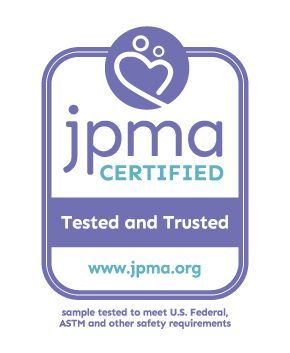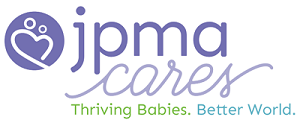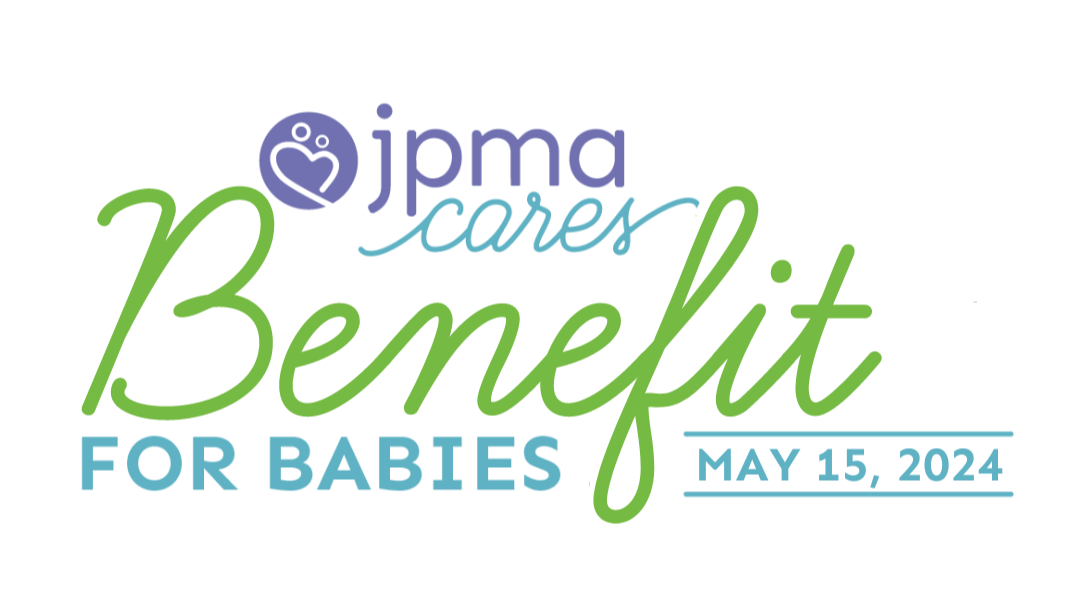Certifié JPMATesté et approuvé pour votre famille
En tant que voix de l'industrie en matière de qualité et de sécurité des produits pour bébés et enfants, JPMA vous aide à choisir et à utiliser les meilleurs produits pour bébé pour votre famille. Le programme de certification primé de JPMA teste plus de 2 500 produits dans 29 catégories différentes pour garantir que les produits répondent aux normes les plus élevées en matière de sécurité de performance. Le sceau de certification JPMA sur votre produit ou emballage signifie qu'il a été testé selon toutes les réglementations fédérales et étatiques, les réglementations volontaires. Norme ASTM et autres exigences des principaux détaillants dans un laboratoire indépendant accrédité par la CPSC. Les produits certifiés JPMA sont testés chaque année selon les normes les plus récentes pour encore plus d'assurance. Les catégories de produits qui peuvent être certifiés JPMA comprennent :
Moniteurs pour bébé
Berceaux/Berceaux
Sièges de bain
Baignoires
Baigneurs
Dormeurs de chevet
Serrures et loquets de sécurité pour armoires
Voitures/Poussettes
Tables à langer
Chaises pliantes pour enfants
Matelas pour berceaux
Portails et enceintes extensibles
Alimentation des sièges d'appoint
Porte-bébés à cadre
Berceaux pleine grandeur
Porte-bébés portatifs
Chaises hautes
Sièges gonflables pour bébé
Sièges de plancher pour bébé
Bascules pour nourrissons et tout-petits
Balançoires pour bébés
Trotteurs pour bébés
Terrains de jeux
Barrières de lit portables
Chaises portables à crochet
Porte-élingues
Porte-bébés souples
Centres d'activités stationnaires
Lits pour tout-petits
Si une entreprise participe à une catégorie donnée, tous les modèles de cette catégorie sont testés et certifiés JPMA. En d'autres termes, si une entreprise est répertoriée comme certifiée dans la catégorie poussettes et poussettes, alors toutes les poussettes de cette entreprise, quels que soient leur style, leur couleur, etc., sont certifiées JPMA. Consultez la liste complète des participants au programme de certification et leurs catégories dans le répertoire des produits certifiés JPMA par catégorie ou par fabricant. Les produits certifiés JPMA sont testés et approuvés, et ils offrent aux parents une tranquillité d'esprit lorsqu'ils achètent les produits les plus sûrs pour leurs enfants. Recherchez le sceau de certification JPMA lorsque vous magasinez pour bébé !

Avez-vous un berceau certifié JPMA et avez-vous besoin de pièces de rechange ? Vérifiez l'étiquette de suivi ! Bien que JPMA certifie la sécurité des produits, elle ne fabrique pas de berceaux et ne dispose pas de matériel de remplacement. L'étiquette de suivi d'un berceau se trouve généralement à l'intérieur de l'un des pieds du berceau. Il contiendra les informations suivantes : Le fabricant ou le nom de la marque Lieu de production Pays d'origine Date de fabrication Numéro de lot Une fois que vous avez ces informations, vous pouvez visiter le site Web du fabricant pour demander des pièces de rechange, consulter le manuel d'instructions et les avertissements, et plus encore. Si vous avez des questions sur le Programme de certification JPMA ou si vous avez besoin de plus amples informations, veuillez contacter Jailynn McGhee, associée à la certification et aux normes de la JPMA à jmcghee@jpma.org ou au (703) 299-8212.
FAQ sur les certifications JPMA
What is JPMA Certification? What does a JPMA Certification Seal mean?
Baby and children’s products must meet minimum federal requirements based on safety and use. The JPMA Certification Seal signifies a product meets these and additional requirements. To become certified, each product is sample-tested at an independent laboratory to verify it meets the highest standards for safety, performance and functionality.
JPMA Certification is voluntary, and it is based on adherence to ASTM standards, federal and state laws and some retail requirements. The program is designed to provide peace of mind to parents that these products have been independently tested to the most stringent standards.
What chemical testing is included in the JPMA Certification Program?
The JPMA Certification Program tests to all federal and state chemical safety requirements for juvenile products. Our protocols require compliance with all 50 states, regardless of where the product is sold. These requirements restrict chemicals such as lead, cadmium, mercury, antimony, flame retardants, phthalates and more.
What is ASTM? Are ASTM’s standards required?
ASTM International, formerly known as the American Society for Testing and Materials (ASTM), is a globally recognized leader in the development and delivery of international voluntary consensus standards. Today, thousands of ASTM standards are used around the world to improve product quality, enhance safety, facilitate market access and trade, and build consumer confidence. The JPMA Certification Program is built on ASTM standards. ASTM standards do not widely address chemical safety but are focused on performance and general requirements. ASTM standards are voluntary, but the JPMA Certification Program and many federal rules for juvenile products rely on the ASTM standard as the basis for their own requirements.
What is the CPSC? What does it mean to test to CPSIA?
The Consumer Product Safety Commission (CPSC) is the federal agency tasked with regulating consumer products. Despite its huge responsibility, the CPSC does not (and cannot) certify or test each individual product on the market. The CPSC has rulemaking and enforcement tools to help regulate consumer products. Signed into law in 2008, the Consumer Product Safety Improvement Act (CPSIA) gave the CPSC a significant role in creating and enforcing federal requirements as they pertain to children’s products. Testing to CPSIA means that a manufacturer meets or exceeds the federal requirement for their product. All JPMA Certified products must test to the applicable federal regulation.
What is the difference between JPMA Certification and GreenGuard Certification?
There are various differences between the two programs. Primarily, JPMA does not create its own requirements, but rather relies on federal, state, ASTM and major retailer requirements to make up its testing protocol. The JPMA Certification Program is a third-party verifier that a company has met or exceeded all of these safety requirements. GreenGuard Certification is more focused on chemical safety and is in addition to existing regulations. Many JPMA Certification Program participants are also GreenGuard Certified.
What is the difference between JPMA Certification and UL Verification?
Underwriters’ Laboratories, or UL as it is universally known, tests and evaluates a variety of products and components. UL’s label on electronics and small appliances is the most recognizable. It means that the product has been found to be free from a reasonably foreseeable risk of fire or electric shock in most environments. The JPMA Certification Program verifies compliance with the UL program for any products that have an electrical component.
What is Prop 65? Why is there a Prop 65 warning on my baby product?
Proposition 65 requires businesses to provide warnings to Californians about possible exposures to chemicals that cause cancer, birth defects or other reproductive harm. California’s Office of Environmental Health Hazard Assessment (OEHHA) maintains the list of Prop 65 chemicals that it considers harmful, and it updates the list at least once a year. At the latest count, the Prop 65 list contained more than 900 chemicals. These warnings are on a wide range of products and have to be posted in California businesses as well, if applicable. Despite being specific to California, all JPMA Certified products are required to have the Prop 65 warning. For many products, this warning is included if there is the slightest possibility of contamination during the manufacturing process.
What are PFAS? Are juvenile products regulated for PFAS?
PFAS are widely used, long-lasting chemicals, the components of which break down very slowly over time. There are thousands of PFAS chemicals, and they are found in many different consumer, commercial and industrial products—primarily outerwear, cooking pots and pans, and other waterproof or stain-resistant materials. This makes it challenging to study and assess the potential human health and environmental risks. Baby products are regulated for PFAS chemicals, primarily through state laws such as those in California and Colorado. Many baby product manufacturers do not add PFAS to their products, and other JPMA Certification Program is an added level of security to ensure they are compliant with the most current PFAS regulations. PFAS are widely used, long-lasting chemicals, the components of which break down very slowly over time. There are thousands of PFAS chemicals, and they are found in many different consumer, commercial and industrial products—primarily outerwear, cooking pots and pans, and other waterproof or stain-resistant materials. This makes it challenging to study and assess the potential human health and environmental risks. Baby products are regulated for PFAS chemicals, primarily through state laws such as those in California and Colorado. Many baby product manufacturers do not add PFAS to their products, and our Certification Program is an added level of security to ensure they are compliant with the most current PFAS regulations.
What are phthalates? Are JPMA Certified products tested for phthalates?
Phthalates (pronounced THAL-eights) are a class of chemicals that are used to make plastics flexible [primarily polyvinyl chloride (PVC or vinyl)]. The chemicals also serve various functions in cosmetics, personal care and cleaning products. JPMA Certified products are tested for phthalates, as required by state and federal regulations.
What are flame retardants? Are JPMA Certified products tested for flame retardants?
Flame retardants are chemicals that are applied to materials to prevent the start or slow the growth of fire. They have been used in many consumer and industrial products since the 1970s to decrease the ability of materials to ignite. JPMA Certified products are tested for flame retardants in accordance with various state regulations.
What are VOCs? Does the JPMA Certification Program test for VOCs?
Volatile organic compounds (VOCs) are compounds that have a high vapor pressure and low water solubility. Many VOCs are human-made chemicals that are used and produced in the manufacture of paints, pharmaceuticals and refrigerants. An example is formaldehyde, which is regulated at both the federal and state level. JPMA Certified products are tested for formaldehyde, which is required by the EPA and various states.
Are JPMA Certified products tested for lead, cadmium or mercury?
Yes, JPMA Certified products are tested for lead, cadmium and mercury, which is required by federal and state regulations.
Are car seats tested for chemicals?
The JPMA Certification Program does not currently include a car seat category, as there is no ASTM standard for car seats. Car seats are regulated by the National Highway Traffic Safety Administration (NHTSA). Federal Motor Vehicle Safety Standard (FMVSS) 213, through incorporation of FMVSS 302, requires that car seats have flame retardant properties, and this is often solved by using chemicals. Many car seat manufacturers work to find chemical-free ways to protect families from the risk of fire in vehicles, while still complying with NHTSA’s flame retardancy requirements, and they make certain models or fashions without these chemical treatments. Learn more about car seat safety here.

















